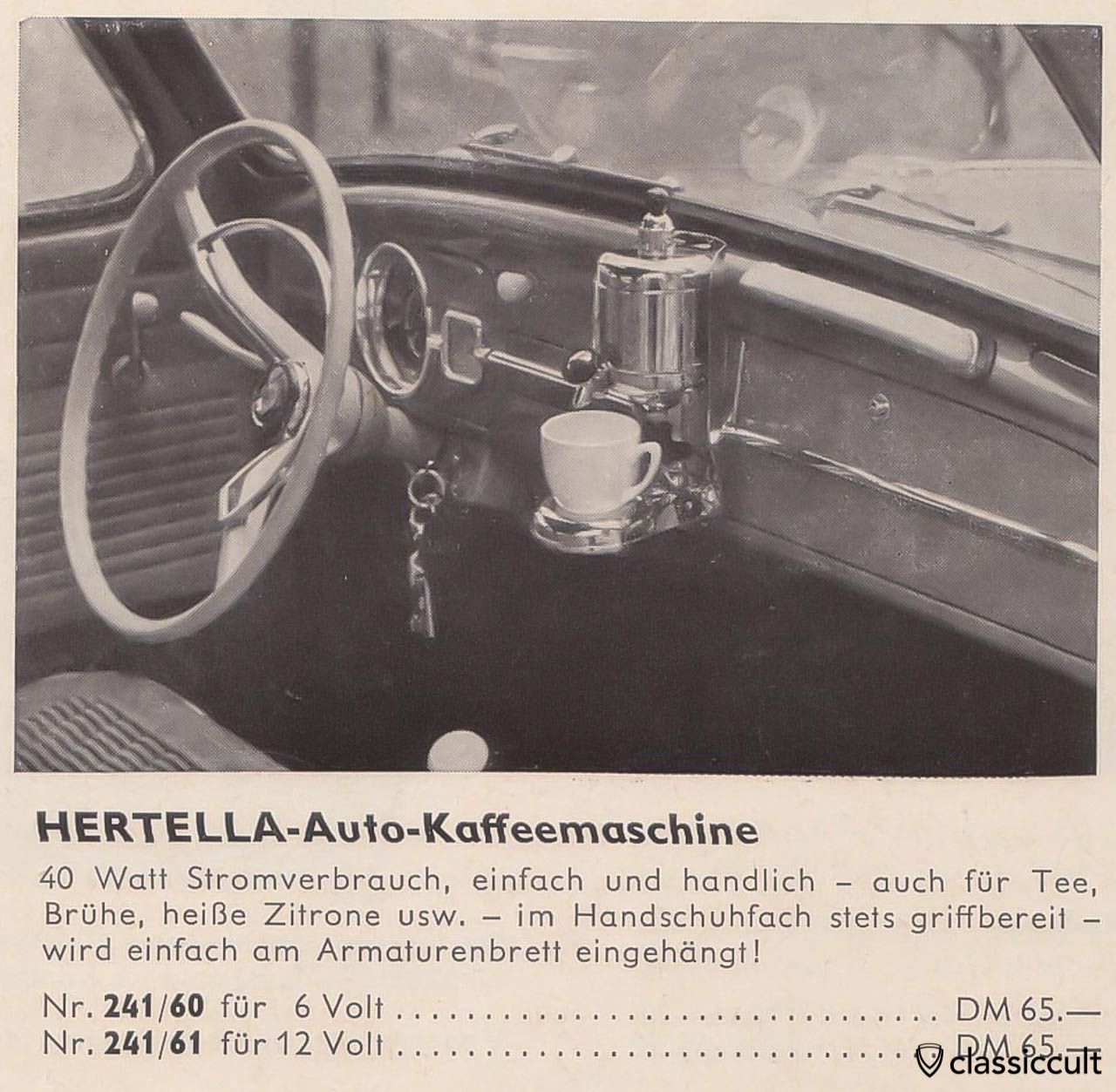The Hertella Coffee Machine Mounted on a Volkswagen Dashboard (1959): The Most European Car Accessory Ever Made

Current auto-industry wisdom holds that no car without cup holders will sell in America. Though this also seems to have become increasingly true across the rest of the world, I like to imagine there still exists a country or two whose driving public holds fast against that particular design vulgarism. Such places would, of course, lie deep in unreconstructed Europe, where nobody can go long without coffee. The solution? The Hertella Auto Kaffeemachine, the first and only known dashboard-mounted coffee maker.
Manufactured specifically for the Volkswagen Beetle, this highly civilized automobile accessory has, 60 years after its introduction, nearly vanished from existence. Judging by the few known examples, it never had the time to evolve past its technical shortcomings. For one, it lacks a power switch: “As soon as you plug it into the cigarette lighter, it just gets hot,” writes The Drive’s Peter Holderith. “And as far as the type of coffee machine that it is, well, you would have to be pretty desperate for caffeine to make coffee in this thing.”
“I always thought they were a percolator, or espresso machine like a Moka… but nope,” says Dave Hord of Classic Car Adventures, who purchased his own Hertella Auto Kaffeemachine from an owner in Serbia. It seems “you fill the vessel with water, put your coffee in the (double layer) screen, and heat up the unit. I presume you heat the unit up with the coffee in it, which means this basically brews coffee as though it’s tea.” Perhaps only a transcontinental road-tripper in 1959 would grow desperate enough to drink it.
Still, as Holderith notes, “the machine does have a few clever features. The porcelain cups that came with it apparently had a metal disc on the bottom of them that allowed them to stick to the machine magnetically” and the unit itself “mounts to the dash with a simple bracket, allowing for the pot to quickly be removed and cleaned when necessary.” Perhaps today’s car designers, a group once again looking to the past for inspiration, will resume the pursuit of dashboard brewing begun by the Hertella Auto Kaffeemachine. If not, Wes Anderson can surely find a use for the thing.
Related Content:
The Coffee Pot That Fueled Honoré de Balzac’s Coffee Addiction
Wake Up & Smell the Coffee: The New All-in-One Coffee-Maker/Alarm Clock is Finally Here!
The Timeless Beauty of the Citroën DS, the Car Mythologized by Roland Barthes (1957)
178,000 Images Documenting the History of the Car Now Available on a New Stanford Web Site
10 Essential Tips for Making Great Coffee at Home
Based in Seoul, Colin Marshall writes and broadcasts on cities, language, and culture. His projects include the Substack newsletter Books on Cities, the book The Stateless City: a Walk through 21st-Century Los Angeles and the video series The City in Cinema. Follow him on Twitter at @colinmarshall, on Facebook, or on Instagram.
The Hertella Coffee Machine Mounted on a Volkswagen Dashboard (1959): The Most European Car Accessory Ever Made is a post from: Open Culture. Follow us on Facebook, Twitter, and Google Plus, or get our Daily Email. And don't miss our big collections of Free Online Courses, Free Online Movies, Free eBooks, Free Audio Books, Free Foreign Language Lessons, and MOOCs.
from Open Culture https://ift.tt/2JBCryz
via Ilumina
Comments
Post a Comment